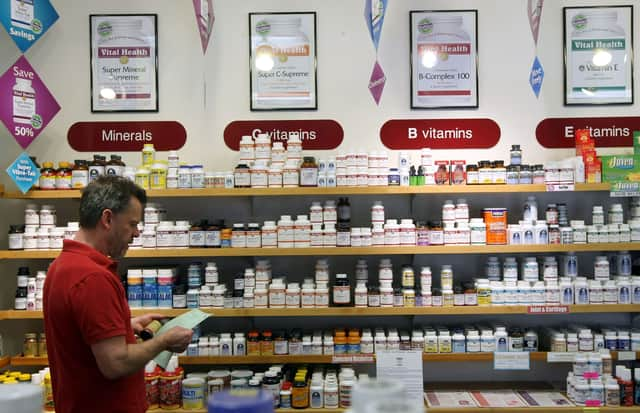Multivitamins could increase cancer risk by 30%, doctor claims calling for them to be prescription-only


Multivitamins could increase the risk of cancer by as much as 30%, and should be labelled with tobacco product style warnings due to the danger of some supplements, charity Killing Cancer Kindly says. Dr Mohammad Muneeb Khan, who founded the charity warned the supplements bombard the body with huge does of unnecessary nutrients - which may allow cancerous cells to grow and multiply - whereas natural vitamins found in foods pose no danger because they are absorbed slowly, and any excess are flushed out.
The multivitamin supplements could increase the risk of developing other cancers such as prostate cancer, bowel cancer, and breast cancer, the charity says. Dr Khan said: "Synthetic pills contain obscenely high and wholly unnecessary volumes of micronutrients that far exceed what the average human body requires. These tiny organic compounds are so numerous that our organs struggle to use them, and they’re left, in effect, to float about the body."
Advertisement
Hide AdAdvertisement
Hide AdDr Khan says the solution should be to 'reclassify' multivitamins as a drug and make people aware of their side effects: "A health warning and prescription would work best alongside the general advice that most people, children and adults alike, do not need additional vitamins in their diet, period.”
It is thought that almost half of people in Britain take a daily supplement, which usually contains what manufacturers call ‘essential’ organic compounds, said to help maintain normal metabolic function. Studies have shown a varied balanced diet, provides all the vitamins the average person needs but the charity says there is a growing body of “compelling” research suggesting a direct link between synthetic vitamin consumption and increased rates of lung cancer, prostate cancer, bowel cancer, and breast cancer - and that risk is the same for all adults regardless of whether they live an otherwise healthy lifestyle.
The charity says that cancer cells have up to 10 times the capacity of normal healthy cells to absorb nutrients floating around the body – including vitamins. Dr Khan said: "In one flagship study, the CARET trial, the increased risk of developing lung cancer from taking a daily supplement including vitamin B6, B9 and B12 was estimated to be nearly 30%. Studies looking at the daily use of supplements including vitamin A and vitamin B complex (including vitamins such as B1, B6 and B12) have, likewise, shown a correlation in increased risk for different types of cancer, though more research is required to confirm by how much."
Dr Khan called for the government to reclassify multivitamin supplements as a medicine to make them available by prescription only. A pioneering study into the cancer risk posed by multivitamin supplements will begin next year and involve KCK collaborating with an American university. “But we need to act now by raising awareness of the potential dangers, and there’s no better way to do this than forcing manufacturers to place a prominent, science-backed warning on every package,” Dr Khan said.
Advertisement
Hide AdAdvertisement
Hide Ad“Ideally, however, the government should go further and regulate the sale of synthetic multivitamins, in the same way that other medicines which carry a health risk if used over a prolonged period are restricted – by making them prescription-only. Like antibiotics, vitamins should be used sparingly, only being taken by those who have a diagnosed vitamin deficiency, and only for as long as required to restore them to health.”
Comment Guidelines
National World encourages reader discussion on our stories. User feedback, insights and back-and-forth exchanges add a rich layer of context to reporting. Please review our Community Guidelines before commenting.
